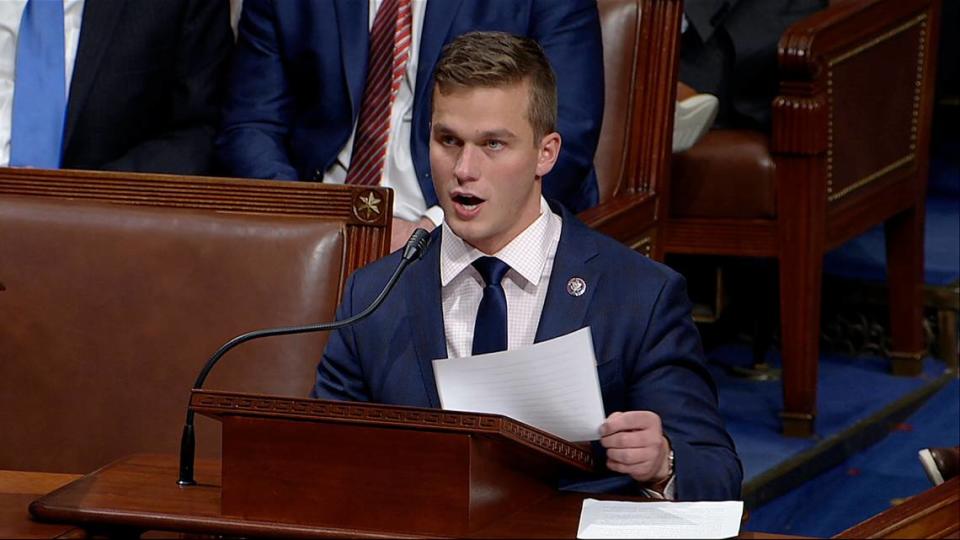How the NC delegation voted on Biden’s coronavirus pandemic relief package
- Oops!Something went wrong.Please try again later.
President Joe Biden’s coronavirus relief package, his top legislative priority, cleared the U.S. House early Saturday morning without the support of a single Republican member.
House Democrats passed the $1.9 trillion American Rescue Plan 219-212. It includes $1,400 checks for many Americans, a $15 minimum wage, extended unemployment benefits, billions for state and local governments and a provision to incentivize states like North Carolina to expand Medicaid. Two Democrats voted against the bill.
It now moves to the U.S. Senate, where the $15 minimum wage provision will be removed due to a Senate official’s ruling. The Senate needs only 51 votes to pass the measure under special budget rules.
North Carolina would receive an estimated $5.1 billion in federal funding from the package, including $215 million for Mecklenburg and Wake counties, according to House Democrats. Charlotte Mecklenburg Schools would receive $365 million. Greensboro would receive $56 million. Other cities, towns and school districts would also receive millions.
“The American Rescue Plan Act will crush the virus, return children safely to the classroom, get vaccines to the people, put dollars into families’ pockets, and put people back to work at a living wage by raising the federal minimum wage,” Rep. Alma Adams, a Charlotte Democrat, said in a statement after the vote.
Republicans argued that the package was too costly and spends too much money on items unrelated to the coronavirus pandemic. They pointed out that all of the previous COVID-19 relief packages had been bipartisan.
“In the face of this ongoing pandemic, what the American people need is targeted, temporary relief that is directly related to COVID,” Rep. Patrick McHenry, a Denver Republican, said. “...If Democrats had worked with Republicans, as they have on five separate occasions since last March, we could have voted today to provide the COVID-related relief Americans need to help end this nightmare.”
All five North Carolina Democrats backed the bill, while all eight Republicans in the delegation voted against it. Democrats are pushing to pass the bill by March 14, which is when enhanced federal unemployment benefits are set to expire.
“Americans cannot wait for relief,” Rep. Kathy Manning, a Greensboro Democrat, said in a statement after the vote.
More than 500,000 Americans have died as a result of the coroanvirus, including more than 11,000 in North Carolina.
“Almost one year into the pandemic, many Americans in our own communities remain out of work and struggle to provide for their families and pay their bills. The need to act is clear,” said Democrat G.K. Butterfield in a statement.
Republican Reps. Ted Budd and Madison Cawthorn, who were vocal critics of the vote by proxy system put in place last year due to the coronavirus pandemic, voted by proxy while they attended a conservative conference in Florida.
Republican Rep. Virginia Foxx, who also spoke at the Conservative Political Action Conference in Orlando on Friday afternoon, returned to D.C. and cast her vote in person.
“No surprise that they’re holding a vote after midnight now on this SHAM ‘relief’ package,” Foxx tweeted.
Proxy votes for Budd, Cawthorn
Budd, Cawthorn and Foxx spoke at an education panel at the CPAC conference. They were joined by North Carolina Lt. Gov. Mark Robinson.
All three have been critical of the vote by proxy system, but Budd and Cawthorn used it for the first time this week. Rep. Patrick McHenry cast votes for them on Thursday and Friday, including on the COVID-19 relief bill.
At least 13 Republican House members voted by proxy while attending the conference, CBS News reported.
The Democratic-led House of Representatives instituted proxy voting last year in response to the coronavirus pandemic. It was the first time the House has ever allowed remote voting. Republicans sued to block the change, but their suit was dismissed.
Budd introduced a bill last year that would withhold pay from any lawmaker who voted remotely or by proxy, saying at the time that “outsourcing the duty of a member of Congress is unconstitutional and wrong.”
In July, Cawthorn, then a candidate for U.S. House, tweeted that Democrats who vote by proxy are “cowards for hiding and not showing up to work.”
Both Budd and Cawthorn used standard language in their letters to the House assigning someone as their proxy, which are required. They both wrote they were “unable to physically attend proceedings in the House Chamber due to the ongoing public health emergency.”
Budd, who is considering a run for Senate in 2022, was in Orlando delivering a short speech about education.
“After Democrats rearranged the House schedule with extremely late notice, Rep. Budd was forced to proxy vote for the first time,” Budd spokesman Curtis Kalin wrote Friday in response to questions about Budd and proxy voting.
The House was originally scheduled to be off Friday, but Democrats announced a change to the schedule on Feb. 16 in order to finish work on the coronavirus relief package.
“Rep. Budd remains philosophically opposed to proxy voting, which is why he has already donated his congressional salary for the days he proxy-voted to the North Carolina Restaurant Workers Relief Fund to support restaurants who were shut down during the pandemic,” Kalin wrote.
Foxx was also critical of voting by proxy, calling it irresponsible and degrading to the integrity of the House. She did not have a proxy cast her vote. Instead she was recorded as not voting on a bill earlier Friday.
With Budd and Cawthorn voting by proxy this week, more than half of the North Carolina delegation has voted that way at some point. Democratic Reps. Adams, Butterfield and David Price have voted by proxy at times over the last year. Republican Reps. Greg Murphy and McHenry have also voted by proxy.
The Senate does not allow proxy voting.
For more North Carolina government and politics news, listen to the Under the Dome politics podcast from The News & Observer and the NC Insider. You can find it on Spotify, Apple Podcasts, Stitcher, iHeartRadio, Amazon Music, Megaphone or wherever you get your podcasts.



